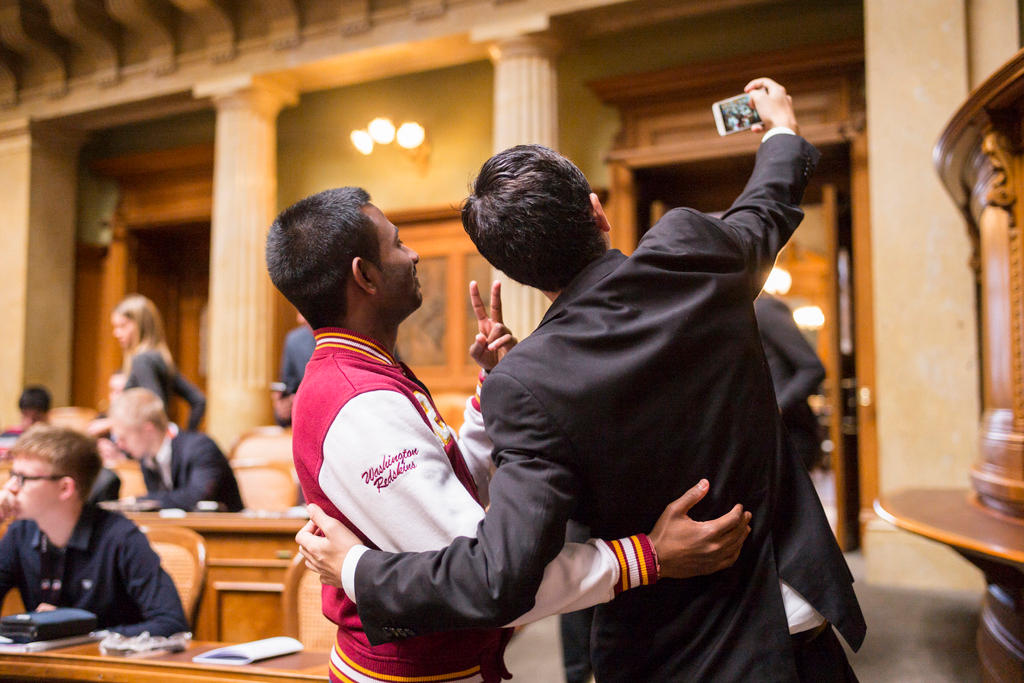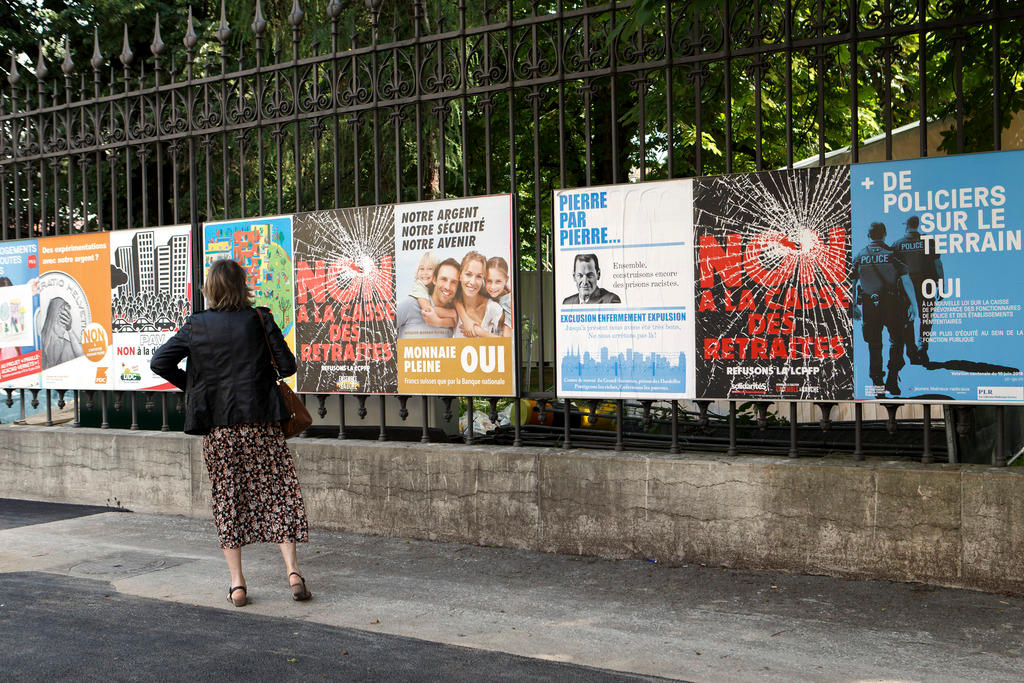It’s time to let 16- and 17-year-olds vote
Sixteen- and 17-year-olds should be allowed to speak for themselves at the ballot box to make their voices heard on issues like climate change, argues Alexandra Dufresne, a children’s rights lawyer based in Switzerland.
One of the limitations of decision-making in a democracy is that neither children nor future generations of people can vote. People living now are, quite understandably, inclined to prioritise their pressing, concrete political concerns over the abstract concerns of people who have not yet been born. Adults are naturally inclined to weigh their own interests and experiences more strongly than those of children.
The effects can be seen in many areas of public policy, including the failure to properly regulate firearms in the US, which disproportionately hurts children and youthExternal link. The US Constitution was amended in 1971, at the height of the Vietnam War, to lower the minimum voting age from 21 to 18 in recognition of the political awkwardness of sending people too young to vote to war.

But this intergenerational tension is greatest in the context of environmental policy. Given the dangers of climate change, the political decisions we make today will have a disproportionate — even devastating — impact on the lives of our children, as 16-year-old climate activist Greta Thunberg eloquently arguesExternal link.
The political awkwardness of divorcing power from responsibility is acute. Take, for instance, the February 2019 discussion, captured on videoExternal link, between 85-year-old US Senator Dianne Feinstein (Democrat, California) and a group of child and teen climate activists. When the discussion becomes heated, the Senator tells a 16-year old climate activist,External link “Well, you didn’t vote for me”. Not surprisingly, many young people argue that without voting rights, they have no choice but to strikeExternal link in order to force politicians to take climate change seriously.
Giving more citizens a voice
By default, democratic decision-making should be open to all citizens who are competent and not otherwise disqualified. Giving young people a voice in the system is not just about protecting the dignity and autonomy of individuals; democracies make better decisions when they take into account the voices of as many people as possible.
Opponents of lowering the voting age usually do not dispute the default position. Rather, they believe 16- and 17-year-old youth are simply not yet competent to vote. They also worry that allowing 16- and 17- year-olds to vote would force democracies to abandon a host of other age restrictions designed to protect children and youth.

More
Are 16-year-olds mature enough to vote? No.
As a lawyer for vulnerable children and teens, I understand these fears, even if they are not borne out by the evidence.External link I spent most of my career advocating for special legal protections for children and youth, based on scientific research showing that the brains of adolescents differ from those of adults in many ways and that, indeed, youth brains continue to mature until age 25.External link
This evidence is frequently cited to support children’s rights arguments that people under 18 should be tried in the juvenile justice systemExternal link rather than in the adult criminal system and forms the basis of US Supreme Court rulings that no person should be subjected to the death penaltyExternal link or to a mandatory life sentence without paroleExternal link for a crime committed while under the age of 18.
However, in assessing competence, the context and type of decision-making matterExternal link. Determining competence in the voting context is different from determining competence in the juvenile justice context.
Competence is generally considered to include deliberative agency, emotional maturity (including the ability to resist peer pressure), independence, and education and experience.
Do 16-year-olds have the judgment to vote?
Some fear that youth lack the deliberative agency — in other words, the judgment — to make important political decisions. Youth are seen as short-sighted and too inclined to see political issues in terms of “black” and “white”. However, a leading studyExternal link evaluating the results of lowering the voting age in Austria found that the quality of voting decision-making by 16- and 17-year-olds was as good as that of adults.
Are they emotionally mature enough to vote?
Another common argument for denying 16-year-olds the right to vote is that teenagers are emotionally immature, in other words, impulsive and susceptible to peer pressure.
The question, however, is whether concerns about youth impulsivityExternal link apply in the voting context. For example, there might be statistical reasons why rental car companies charge people under 25 more than older people. Statistically speaking, youth may be more likely to take physical risks, act impulsively, and judge themselves physically invincible than young adults.
But this does not mean that youth behave more recklessly when confronted with a deliberative decision like voting that does not involve physical agility or a spur-of-the-moment risk assessment. Indeed, in decision-making domains involving deliberation, the American Psychological Association has determined that adolescents are as mature as adultsExternal link.
What’s the role of peer pressure?
The second question is whether peer pressure comes into play when the action — like voting — takes place in secret, at least in jurisdictions that protect the secrecy of the ballot. Moreover, there may be a positive selection effect. Whereas many 16-year-olds in the US want to drive, regardless of maturity level, only teens who are mature enough to engage politically are likely to make the effort to vote.
More fundamentally, we should not assume that the peer pressure teens experience is always negative. Currently, there is a lot of peer pressure on youth in the United States to engage in political activism, as a result of the Parkland school shooting and the relentless epidemic of shooting deaths of young people of colour. In Switzerland and Europe, there is peer pressure to join environmental movements. To be sure, examples of youth being on “the wrong side of history” also abound. But we cannot say that categorically, teens as a group make poorer political decisions than adults.
Are young voters independent?
Some also argue that youth are fundamentally dependent on others, and that the people they are dependent upon (usually their parents) will persuade or coerce them to vote a certain way. These concerns are overstated. In many jurisdictions, ballots are secret. Moreover, we allow 16- and 17-year-olds (and younger teens and children) to engage in public political acts such as volunteering for political campaigns, canvassing, organizing, writing, demonstrating, and lobbying elected representatives, despite the concern their political opinions might be influenced by their parents. Is voting substantially different?
Do young people have enough life experience?
A final argument is that 16-year-olds simply have not lived long enough to amass the education and personal experience necessary to make good voting decisions. However, an analysis of survey data from the US indicates that American 16- and 17-year-olds show essentially the same level of developmentExternal link required for civic participation as do young adults.
As for experience, the key insight is that a robust democracy needs to account for the experiences of all. It needs to take into account the devastating effects of sickness, poverty, and loneliness among many in the elderly population.
But it also needs to account for the terror students in the US feel during lockdown drills at school, knowing that the elected politicians refuse to pass common sense gun safety regulations. It needs to take into account the fear and anxiety that many teens across the world feel about climate change. And even if it is true that as a group, youth tend to be more “progressive” than older people or more likely to see the world in clear “black and white” moral terms, that should not, in and of itself, be a reason to exclude them.
The world as it is
In an ideal world, adults would protect children and would not pass the costs of poor decision-making to future generations. Students in the US would go to school without worrying about being shot; students in Europe and around the world would not have to strike to get adult politicians to take climate change concerns seriously. In an ideal world, the question of whether we allow people to vote at 16 or 18 would have symbolic import but not much practical impact because adults could be trusted to factor the interests of youth into their voting decisions.
But our human rights record with respect to children is dismal. And we know from experience that as between speaking for ourselves or trusting someone else to do that for us, we would all rather speak for ourselves. For this reason, teens in the USExternal link and in EuropeExternal link are organising for the right to vote.
We can’t give future people a vote, and we can’t give young children a vote. However, we can — within reason — listen to young people’s call for a greater voice in their future. Allowing 16- and 17-year-olds to vote is not going to solve our violence or environmental problems. But it is a step — however modest — in the right direction.
The views expressed in this article are solely those of the author, and do not necessarily reflect the views of swissinfo.ch.
Several countries and localities — including Argentina, Austria, Brazil, Ecuador, Malta, Scotland, Glarus in Switzerland, several German states and the city of Takoma Park in the US state of Maryland — already allow 16-year-olds to vote in federal or local elections. The few empirical studies that have analysed the results of lowering age limits have had encouragingExternal link, though occasionally mixedExternal link, results.
A proposal to lower the voting age was recently raised (but defeated)External link in the US House of Representatives. The issue is being discussed and consideredExternal link in Switzerland as well as in several US statesExternal link and municipalitiesExternal link and in other countries such as CanadaExternal link.
Many supporters argue that age limits should be reduced to 16 to increase voter turnout among young adultsExternal link, based on the theory that voting is habit-forming and people are most likely to vote for the first time when still attending schoolExternal link and living with their parents in their home communities. The argument is supported by the relatively high level of turnoutExternal link among 16- and 17-year-olds in Takoma Park, Maryland after the voting age there was lowered.

More
A revolution that slipped under the radar?

In compliance with the JTI standards
More: SWI swissinfo.ch certified by the Journalism Trust Initiative




You can find an overview of ongoing debates with our journalists here. Please join us!
If you want to start a conversation about a topic raised in this article or want to report factual errors, email us at english@swissinfo.ch.